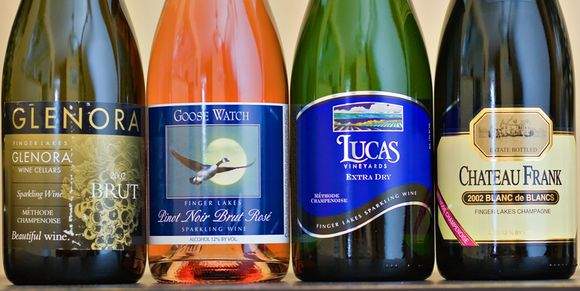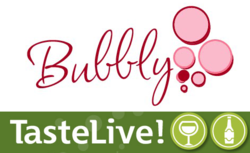
By Evan Dawson, Finger Lakes Editor
In the flickering glint of the strobe lights, amidst the pulsing beat and bodies, it was impossible to see the edges of the room. No matter. The party was in the middle, and it centered around Riesling. He was always the magnet, the draw, the energy. Tonight, like most nights, he had brought a few friends. The girls would wink and nod at his entourage, but ultimately they were fighting for the mysterious man who was known for being simultaneously acerbic and sweet. He always gets the girl.
That's pretty much the story of Finger Lakes wine these days, and for good reason: riesling deserves attention when it can be made in a unique and world-class fashion. But if that party were to slow down for just a moment, and the lights were to come back on, you'd see two lonely souls sitting in the corner. That would be rose, outstanding but often ignored in the Finger Lakes, and its similarly hard-to-sell cousin, sparkling wine.
"Every year you have the opportunity to make amazing sparkling wine in the Finger Lakes," said Hosmer Winery's winemaker Aaron Roisen. He told me that there is something that sets the Finger Lakes apart from other American wine-growing regions when it comes to sparkling wine: timing.
"There comes a point during the growing season when the grapes will hit about 19.5 brix [he's talking about sugar] and 9.5 grams per liter of acid," Roisen said. "I can't tell you how valuable that balance is. It's perfect for sparkling wine, and when the grapes come in at that point, it's almost effortless to balance the fruit with the acid."
Yes, Roisen explained, other growing regions get to 19.5 brix and beyond — just like the Finger Lakes. But he went on to say that the acids are often out of whack compared to the sugar in those regions. In upstate New York the sugars and acids arrive together in a package uniquely suited for bubbles.
"Of course, most producers allow the grapes to ripen further because they make primarily still wine," Roisen said. "But you almost always have that option, and more winemakers are taking advantage of it."
He's right about that.
Willy Frank of Dr. Konstantin Frank Vinifera Wine Cellars famously touted the Finger Lakes as a world-class sparkling wine region that could equal Champagne. Hyperbole? Sure, but two decades later the region has gone from a handful of sparkling wine producers to several dozen. Some producers use non-traditional sparkling wine grapes; Atwater uses some Gewurztraminer, McGregor has used riesling, Hosmer uses Cayuga White. But most now use the traditional Champagne grapes.
Roisen is eager to see how Hosmer's first-ever Brut Rose turns out, made from Pinot Noir. "That won't be released until 2012," he said.
And there's another issue for Finger Lakes sparkling wine producers: How long to hold onto it? "Ideally I'd like to give it three years in the bottle for the main sparkling vine varieties," Roisen said, but he noted that for many wineries, release date can come down to financial issues. "We're comfortable with our schedule, but I know other producers have to make difficult decisions."
True to Roisen's description, many Finger Lakes sparklers have no trouble showing a bracing, stony character. In some cases it can be severe. More, however, are adding a layer of yeasty richness. Roisen points to the 1997 Lamoreuax Landing Brut as his favorite to date. "That wine knocked it out of the park," he said. "Lamoreaux is a consistent producer of excellent sparkling wine. They know what they're doing."
 Now the challenge is to convince consumers that there is good value for these limited production wines. Some wine writers will get their first taste tonight during a NYCR-hosted TasteLive event on Twitter organized by Finger Lakes Wine Country. Saturday, more than three dozen sparklers will be open for tasting at the Watkins Glen Harbor Hotel in an event called "Bubbly!"
Now the challenge is to convince consumers that there is good value for these limited production wines. Some wine writers will get their first taste tonight during a NYCR-hosted TasteLive event on Twitter organized by Finger Lakes Wine Country. Saturday, more than three dozen sparklers will be open for tasting at the Watkins Glen Harbor Hotel in an event called "Bubbly!"
These efforts are important because sparkling wine remains, like dry rose, a tough sell. But as the lights turn down low once more, and the music picks back up, you might notice the shy cousins in the corner of the room. They're standing up now, finally looking for attention. They want to dance.
